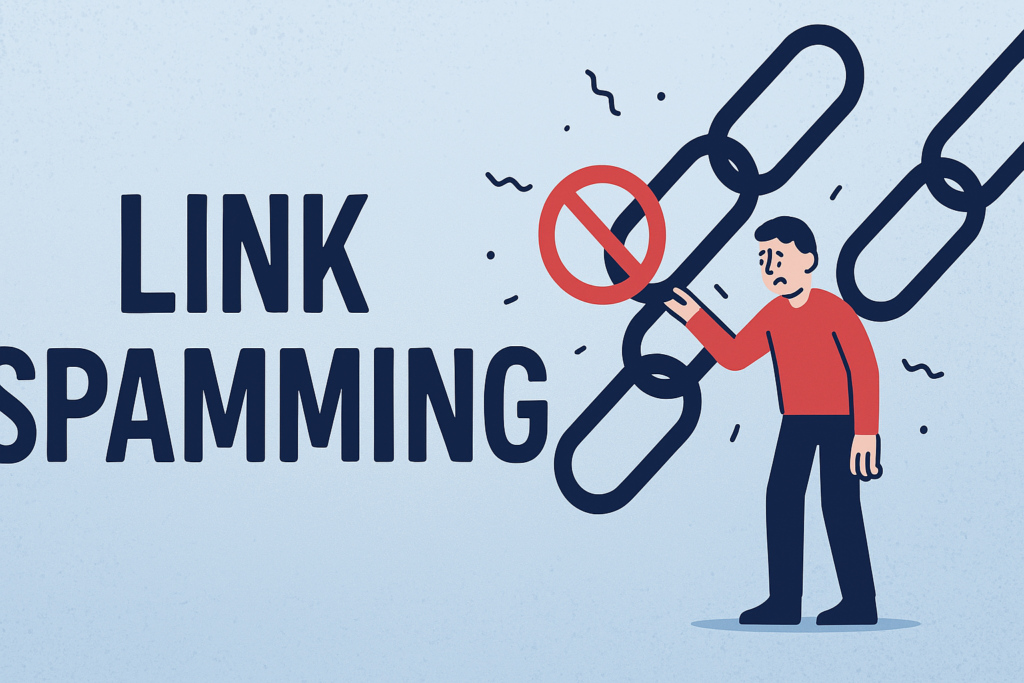
As we all know, every single trend is evolving. So is the technique of link building. Link Building is a process; not everyone is doing it correctly. So we must be wary of the link building techniques and ensure we are not implementing any link spamming.
We created this comprehensive guide to help you stay safe and protect your website from malicious link spam.
This blog will provide the necessary information on what link spamming is, why it’s essential to avoid these links and a detailed overview of 11 types of known link spam that you need to be aware of.
With our guidance, you’ll be able to better recognize and safeguard against potential threats!
So, let’s first understand,
What Is Link Spamming?

Link spam or link spamming is a technique of manipulating search engine results by creating backlinks from low-value sites. It is considered unethical and can result in a Google penalty for those who use it to increase their page rankings.
Why Should You Avoid These Links?
Here are five reasons why you should avoid them:
- Impacts on website SEO
It’s undoubtedly the most dangerous threat to a website’s SEO, as it will adversely affect your page rankings and eventually lead to decreased overall performance, which can have a lasting negative impact on your website.
- Increases bounce rate
Not only can it result in a higher bounce rate, but it also upends the user experience. Suppose people encounter irrelevant and unrelated pages when performing online searches due to these activities. In that case, they will be instantly discouraged from browsing your site any further – leading to more bounces than ever before!
- Penalties from search engines
Google and other major search engines have laid out clear guidelines about link spamming, and any suspicious activity in this regard will lead to penalties. So, it’s better to avoid such tactics as they can heavily damage your reputation on search engines.
- Damage to brand reputation
It might seem like an excellent way to make quick money, but it can significantly damage your brand reputation if caught with illegal activities or unethical practices. It also makes it difficult for genuine customers to find your website due to the low-quality links.
- Wasted time and resources
They are a complete waste of time and resources as they usually don’t last long, and it’s not worth investing in them. Instead, invest in high-quality link-building activities that yield quality backlinks, which are more likely to bring higher page rankings.
Now that you know the basics of link spamming, let’s take a look at some of the types of link spam you should stay away from;
11 Types Of Link Spam You Should Avoid
With so many different forms of link spam, it can be hard to keep up. Here are eleven of the most common types you should be aware of.
Paid-Link
Search engines can quickly identify the presence of bulk paid links on pages. This type of link spam involves purchasing links from websites with low-quality content and irrelevant topics.
Link building using this tactic is usually done to promote swift page rankings; nevertheless, it’s one of the riskier strategies that may result in severe loss. So, ensure you are not buying links from these websites and only doing a genuine link building activity.
Domain Cleansing
Cleansing domains (AKA 301) are an unethical form of link manipulation that is classified as a “black-hat SEO” technique. By utilizing 301 redirects, spammers can move or transfer ranking credit from one penalized domain to another.
Initially, they will first use a page on one domain to generate links, then 301 redirect that page to another. The intention is to pass the ranking credit from the penalized domain onto the new one, but this can have severe consequences if caught by search engine algorithms.
If Google discovers your use of this technique, they may take serious action, such as Penguin turning 301 redirects to 404 immediately.
Article Marketing
Many digital marketers have chosen this technique as their go-to link building strategy. However, they are often misusing it. Rather than developing high-quality articles with authentic content, many create blog posts full of keywords and unnecessary details that provide little value. The primary purpose would be to link building.
Due to its poor quality, such content doesn’t provide any value to the readers and becomes an easy target for search engine algorithms. So, it’s suggested not to invest your time and resources in article marketing and instead create high-quality content for link building.
Low-Quality Press Release Syndication
A practical solution is premium syndication services if you want to acquire external links. These come with a cost, including comprehensive editorial guidelines and fact-checking. Although low-quality syndication services are cheaper, the content produced is usually of lower caliber, which increases your chance of getting link spam; this can damage your brand’s reputation.
So, to maintain the high ranking of your brand on SERPs, Get clear from any service providers offering to publish press releases, as they will fail to generate desirable results.
Link Farms
Link farms are a network of websites that connect and depend only on this process to generate backlinks. Generally, the content on these sites is meaningless and low-grade in quality – it will not benefit your website as search engines recognize them as malicious or suspicious links.
Comment Spam
Most spammers have been utilizing this technique for the longest time. They post comments on various websites of interest, typically linked to their blog or website in the message body. To make matters worse, they sometimes even use automated software that posts such links pointing back to them across multiple pages on different sites.
Search engines have become very clever in identifying these link-building techniques, giving little credit to such links.
Site-Wide Links
These links are usually present in sidebars and footers of websites, linking back to the domains multiple times. This leads to an unnatural link profile, which search engines don’t favor. Nevertheless, Google Reduced its link-juice-passing capacity since most footer links that lead to external sites are either sponsored or maliciously meant to manipulate search results.
Directory Farm
They are a group of websites that store links to other sites, like Yellow Pages. Unlike link farms, they don’t have any content and are solely used to store links. If these directory farms link to your website, they don’t pass any link juice to your site. So, it’s better to steer clear and avoid them together, as they won’t do anything good to your website.
However, there’s a massive crowd of online directories, and search engines have stopped giving them credit.
Forum Spam
This technique includes posting your website link on forums to gain more visitors. This method may have worked in the past, but now they are just a time-wasting activity.
Most forum moderators know such link-building techniques and even provide a warning message when any user posts a link to an external website. Moreover, search engine algorithms also understand this technique and demote sites that use it in their rankings.
Single Post Blogs
There are web 2.0 sites that allow you to create your blog (or other content) on the platform (WordPress, Blogger, Tumblr, etc.) and link back to your website with a single post. They are usually low quality, which is why search engines don’t recognize them as authoritative sources.
Social Bookmarking Sites
These sites let users share their websites and content on the platform. The problem is social bookmarking sites themselves are not as authoritative or valuable to search engines as they were before. Since users can post their links on such websites, they don’t get much credit from them.
Therefore, it’s better to use such services with precaution and build links organically, as the link-building process takes time and effort for you to gain authority.
Final Thoughts
So, what you should or shouldn’t do in link building is clear. Then why wait to check your link building strategies and ensure you avoid link spamming?
Even Though, If you have any questions related to the topic, feel free to leave your questions in the comment section. We will be happy to answer you.
Thanks for reading 🙂


